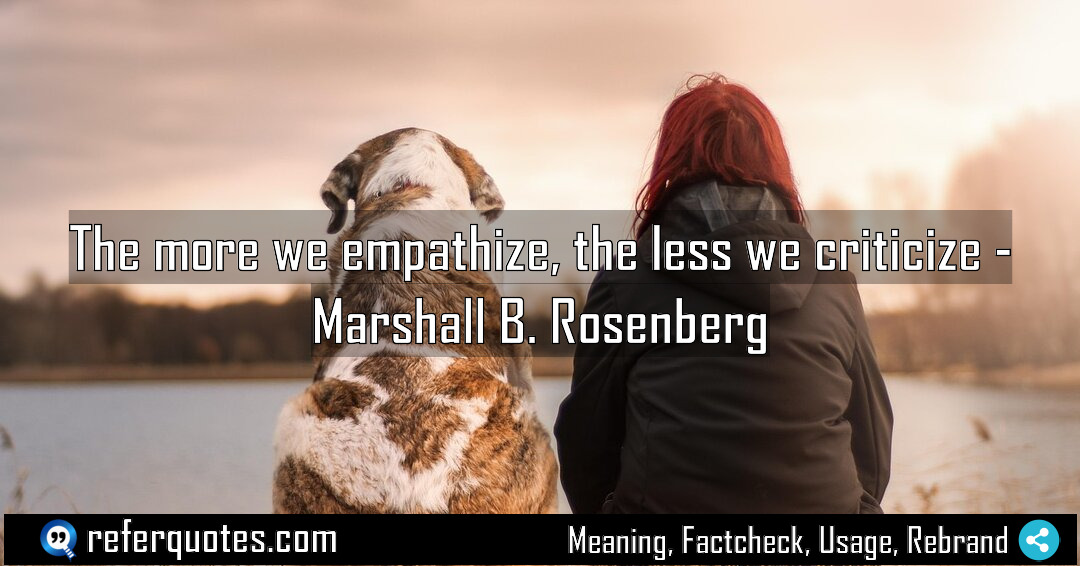
You know, “The more we empathize, the less we criticize” is one of those ideas that seems simple but completely flips your perspective. It’s about shifting from judgment to understanding, and honestly, it’s changed how I interact with everyone.
Share Image Quote:
Table of Contents
Meaning
At its heart, this quote means that genuine understanding naturally dissolves our need to find fault. When you truly get where someone is coming from, judgment just doesn’t have the same power.
Explanation
Let me break this down for you. Think of criticism as a surface-level reaction. We see a behavior we don’t like, and we label it. But empathy is the tool that lets you dive deeper. It’s the act of trying to understand the need or the feeling behind that behavior. And here’s the magic part: once you connect with that underlying need—the fear, the frustration, the simple human desire to be heard—the criticism just… evaporates. It becomes irrelevant. You’re no longer focused on what they did “wrong,” you’re focused on what they need. It’s a complete game-changer for communication.
Quote Summary
Reading Level63
Aesthetic Score82
Origin & Factcheck
This is straight from the work of Marshall B. Rosenberg, the founder of Nonviolent Communication (NVC). It’s from his 2005 book, Raising Children Compassionately, which was published in the United States. You sometimes see similar sentiments floating around, but this phrasing is uniquely Rosenberg’s.
Attribution Summary
Where is this quotation located?
| Quotation | The more we empathize, the less we criticize |
| Book Details | Publication Year/Date: 2004; ISBN/Unique Identifier: 9781892005140; Last edition: PuddleDancer Press, 1st Edition, 48 pages. |
| Where is it? | Chapter: Empathy Before Judgment, Approximate page from 2005 edition |
Context
Rosenberg was specifically talking about parenting in this book. He was making the case that when your kid is acting out, the traditional punitive or critical response just creates more distance. But if you can empathize with the child’s unmet need—maybe they’re tired, hungry, or just needing connection—the entire dynamic shifts from a power struggle to a collaborative problem-solving session.
Usage Examples
This isn’t just theory; you can use this today. Here’s how:
- For Parents: Instead of criticizing a tantrum with “Stop being so difficult!”, try to empathize: “You’re really upset right now because you wanted to keep playing, huh?” The criticism melts away.
- For Managers: Instead of criticizing a missed deadline with “This is unacceptable,” empathize: “It seems like you were blocked on X. What support did you need?” You solve the root cause.
- In Relationships: Instead of criticizing a partner with “You never listen!”, empathize: “It sounds like you’re feeling unheard. Is that right?” It de-escalates instantly.
To whom it appeals?
Share This Quote Image & Motivate
Motivation Score80
Popularity Score74
Shareability Score78
FAQ
Question: Does this mean we should never give constructive feedback?
Answer: Not at all! It means feedback becomes more effective. You lead with empathy for their situation, which makes them receptive, and then you can collaboratively address the behavior. It’s feedback with understanding, not instead of it.
Question: Is it really possible to empathize all the time?
Answer: Honestly? No. It’s a practice, not a perfect state. The goal is to catch yourself when you’re criticizing and ask, “What might they be needing or feeling?” That simple question is the practice.
Question: What if someone is genuinely being unreasonable?
Answer: That’s when it’s hardest—and most necessary. Their “unreasonable” behavior is almost always a loud signal of an unmet need. Empathizing doesn’t mean you agree with their actions; it means you’re trying to understand the pain behind them so you can actually resolve the conflict.
Similar Quotes
You know, “The more we connect with our feelings” is one of those simple truths that completely reframes how we handle conflict. It shifts the power from trying to control…
You know, the more we judge, the less we understand… it’s a truth that hits harder the more life experience you get. It’s about how our snap judgments create a…
Empathy allows us to understand without needing to agree. It’s a game-changing concept that separates true connection from simple debate. When you grasp this, your conversations transform from battles into…
You know, that idea that “Criticism is futile; it puts a person on the defensive” is one of those game-changers. It completely reframes how you approach giving feedback, shifting the…
You know, “Empathy turns conflict into connection” is one of those ideas that sounds simple but is absolutely transformative in practice. It’s not about winning an argument; it’s about transforming…
